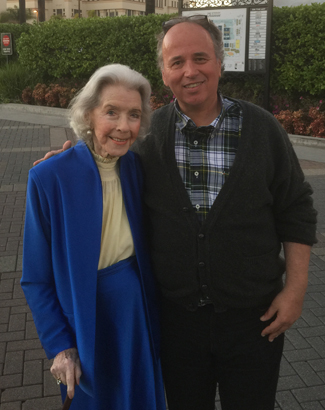Filmmaker Roger Memos ’79 Honors the Integrity of Blacklisted Film Star

In 1935, Marsha Hunt landed her first leading role in the film The Virginia Judge. She was 17. Her career and popularity as an actress blossomed after that, and she became something of an activist during World War II, when she sold war bonds around the U.S. and appeared as a hostess on Saturday nights at the Hollywood Canteen for American servicemen. In 1950, she appeared on Broadway in George Bernard Shaw’s comedy The Devil’s Disciple and her photo graced the cover of Life magazine.
Abruptly, her career in full flight, the phone stopped ringing. She soon learned that her name was listed in the publication “Red Channels: The Communist Influence in Radio and Television,” among names of alleged communists or those with communist affiliations in the entertainment industry. She could be cleared from the blacklist if she apologized for accompanying such performers as Humphrey Bogart and Lauren Bacall on a 1947 Washington, DC, trip to support the Hollywood 19: movie producers, directors, and screenwriters who refused to answer questions regarding their alleged communist affiliations before the House Un-American Activities Committee.

Hunt refused to kowtow to what she called “that corrupt committee,” thus ending her acting career. Instead of giving up, she moved on to become one of the first celebrity activists, working for the United Nations and its agencies, dedicating herself to world hunger, cerebral palsy, and homelessness.
Though Hunt rose above the unfairness of her situation, her story outraged everyone who heard it, including screenwriter, producer, and director Roger C. Memos ’79, who met Hunt while he was working on a PBS documentary on blacklisted Screenwriter-Producer Carl Foreman. “I was impressed by her career in radio, early television, and, of course, her movie career during the Golden Age of Films,” recalled Memos. “In 1993, she wrote a fascinating account of her life during this heyday, The Way We Wore: Styles of the ’30s and ’40s.” He began work on a film documenting the actress’ life.
It’s been a labor of love, and now, more than nine years later, the film, Marsha Hunt’s Sweet Adversity, is ready for public view. You can see it at the 15th Annual New Hampshire Film Festival in Portsmouth, Oct. 15–18. “Sweet Adversity” is taken from a line in Shakespeare’s As You Like It. “Sweet Adversity to me means that Marsha rose above adversity and found new meaning in her life, and this, to me, is very sweet and comforting,” Memos explained.
Several KSC alums will be at the Portsmouth screening, so, if you go, make sure you introduce yourself to Roger. He’ll be delighted to see you.





